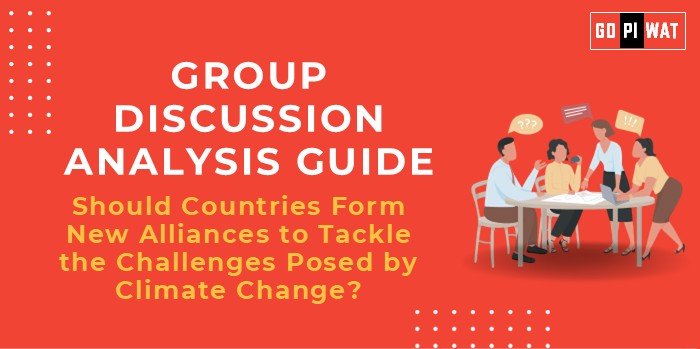📋 Group Discussion Analysis Guide
🌍 Should Countries Form New Alliances to Tackle the Challenges Posed by Climate Change?
🌟 Introduction to the Topic
Opening Context: Climate change has evolved into an unprecedented global crisis, demanding international cooperation that transcends traditional alliances. Recent events such as COP28 underline the urgency to reevaluate existing partnerships and explore new frameworks for action.
Topic Background: Over the years, multilateral organizations like the UNFCCC have spearheaded efforts to address climate change. However, rising emissions and insufficient commitments from major economies highlight the need for innovative alliances tailored to tackle regional and sectoral challenges.
📊 Quick Facts and Key Statistics
- 🌍 Global Carbon Emissions: 36.8 billion metric tons in 2022 – reflects the pressing need for coordinated action.
- 💰 Economic Losses: $280 billion in climate-related disasters in 2022 (Swiss Re).
- 🔋 Energy Transition Investments: $1.1 trillion invested globally in renewable energy in 2022 (IEA).
- 🌏 Climate Refugees: Over 20 million people displaced annually due to climate impacts.
👥 Stakeholders and Their Roles
- 🏛️ Governments: Policy creation, funding, and implementation of climate action plans.
- 🌐 International Organizations: Facilitate agreements and monitor progress (e.g., UNFCCC, IPCC).
- 💡 Private Sector: Drive innovation in green technologies and fund sustainable projects.
- 🤝 Civil Society: Advocate for accountability and equitable climate solutions.
🏆 Achievements and Challenges
✨ Achievements:
- 🌍 Global Agreements: Paris Agreement (2015) set a framework for climate action.
- 🌱 Renewable Energy Growth: Wind and solar capacity increased by 15% globally in 2023.
- 💸 Carbon Markets: Emerging as viable tools for incentivizing emission reductions.
⚠️ Challenges:
- 💰 Insufficient Funding: $2.4 trillion required annually by 2030 for green transitions.
- ⚔️ Geopolitical Tensions: Affect cooperation, especially between high-emission economies like the US and China.
Global Comparisons:
- ✅ Success: EU Green Deal’s ambitious targets for carbon neutrality by 2050.
- ❌ Struggles: Developing countries often lack resources to fulfill commitments despite significant impacts.
Case Studies:
- 🌟 Success: Bhutan’s carbon-negative model through forest preservation.
- 🌊 Challenge: Small Island Developing States (SIDS) struggle with rising sea levels and limited support.
✨ Structured Arguments for Discussion
- ✅ Supporting Stance: “New alliances could foster technology sharing and financial support for developing nations.”
- Example: “An alliance like the International Solar Alliance (ISA) has shown how collaboration can boost renewable energy adoption.”
- ❌ Opposing Stance: “Existing frameworks should be strengthened instead of fragmenting efforts.”
- Example: “The UNFCCC and COP processes already offer inclusive platforms for global dialogue.”
- 🔄 Balanced Perspective: “Complementary alliances can address gaps in existing systems while retaining global coherence.”
- Example: “Regional coalitions could amplify the UNFCCC’s efforts by focusing on localized challenges.”
🎯 Effective Discussion Approaches
- 📖 Opening Approaches:
- “Start with compelling data, such as the $280 billion economic losses from climate disasters.”
- “Highlight a success story like the ISA’s achievements in promoting solar power.”
- 🔄 Counter-Argument Handling:
- “Acknowledge valid critiques of new alliances but emphasize complementary potential.”
📈 Strategic Analysis of Strengths and Weaknesses
- 💪 Strengths: Enhanced cooperation, technology transfer, regional focus.
- ⚠️ Weaknesses: Risk of duplication, geopolitical resistance.
- 💡 Opportunities: Green jobs, innovation, leadership roles for emerging economies.
- 🚨 Threats: Funding gaps, political instability.
📚 Connecting with B-School Applications
- 🌟 Real-World Applications: Explore potential B-school project themes, such as carbon trading mechanisms or sustainable finance models.
- 💬 Sample Interview Questions:
- “What are the risks and benefits of forming new climate alliances?”
- “Can regional alliances substitute for global frameworks in climate action?”
- 📖 Insights for B-School Students:
- Delve into topics like public-private partnerships, green finance, and global sustainability indices.


